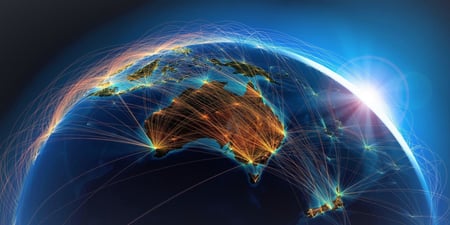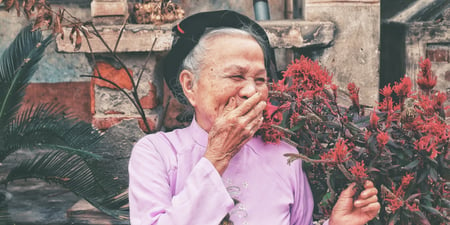
It’s late 2019 and you’re on the tarmac waiting to take a flight overseas to Singapore. You excitedly explain to the passenger seated beside you that it’s your first holiday in months and you can’t wait to land and start your adventure.
They turn and look at you with a blank face, advising you to enjoy your trip away, as it may be the last one for a while. They advise that early next year the entire world will shut down due to a global pandemic[1], and devastatingly, there will be over a million lives lost[2] - and depending on where you live, you may not be able to leave your house for months.
What would you have thought at the time? Perhaps, that this person was somewhat delusional?
Yet here we are less than a year later, and our world is still adapting, transforming, and processing the very real and devastating effects of COVID-19. Despite signs of recovery in some parts of the world[3] and easing of restrictions, there is no set time frame for a pre-covid way of life.
The reality is, that the pandemic has forced us to create a new playbook that is still unfolding and can become redundant in moments.
Our New Normal
As individuals, we’ve all been impacted by coronavirus in very different ways, yet at the same time, aptly phrased by the United Nations, we are all in this together[4].
For some, there’ve been positive outcomes; working from home has meant no commute, more time with family and a renewed focus on health. Yet for others, the pandemic has meant economic loss, relationship breakdowns, the passing of loved ones, poor health and feelings of isolation.
Compounding our personal circumstances, each of our country's responses to COVID-19 and the preparedness of our healthcare systems have been varied. This variance has created a shift in trust levels across the world. People now look to their employers, directly to individuals within the science and medical community, as well as major news outlets for credible information.
Despite the above, it’s important to acknowledge the sound progress that has been made. Testing has increased, giving us more indicators of public health, plus we know a lot more about how the virus behaves[5] and what activities pose the highest risk, and we now have practical approaches to reducing our risk of exposure[6] .
Impact To Global Healthcare
The World Health Organisation (WHO) recently released the outcomes of a pulse survey across 105 countries and found that 90% of respondents reported disruptions to essential health services since COVID-19[7]. Not only did this survey highlight the cracks in our existing healthcare systems, but also the importance of investing in health systems that fully respond to people’s needs throughout their lives.
Further, in Australia, the weighting of services towards treatment of acute illness rather than prevention or wellness promotion has been identified as a major constraint in our healthcare system.
With acknowledgement amongst global leaders, there’s an urgent requirement for healthcare reform, along with the need to focus on preventative healthcare (with the constraints of social distancing and isolation), what’s next?

Pivoting And Digital Health
Coronavirus has forced businesses to pivot quickly to find new ways of doing things - for some, this has been as a matter of survival, for others it has been an opportunity[8] to look closer at non-conventional ways of working and adapting this to a longer-term view of their business model.
In the health sector, telehealth services have exploded with reports that the global telehealth market is expected to grow[9] from $41 billion in 2019 to $155 billion[10] in 2027.
In the United States, an additional 80 new services have been added with 76% of Americans advising they would use telehealth services beyond the pandemic compared to 11% pre covid[11].
In Australia, digital technology has enabled Australians to stay connected during the pandemic and is both facilitating and disrupting our healthcare.
Noncommunicable Diseases (NCDs) And Coronavirus
In the context of COVID-19, we know that people suffering from NCDs are at a higher risk[12] of developing a complication or worse.
In a paper published by the WHO in February this year, it is reported that non-communicable diseases, such as cardiovascular diseases, cancer, diabetes and chronic respiratory diseases, are the leading global cause of death and are responsible for just over 70% of deaths worldwide[13]. In Australia, 89% of deaths each year are caused by NCDs, and in the United States 88%, with 15% of these deaths premature.
The increased demand for the use of virtual health technologies as a convenience due to NCDs, combined with the need for preventative care will be critical to capturing growth opportunities as consumers will require access to more integrated healthcare solutions.
Complementary Medicine (CM) In A Digital Environment
Telehealth services are generally defined as services provided by GP’s, nurses, mental health professionals, allied health providers and specialist doctors. Yet, the demand for virtual health services is not limited to these conventional medical services, nor is it limited to acute or chronic healthcare.
Complementary therapies are defined by the US National Center for Complementary and Integrative Health (NCCIH)[14] as 'a group of diverse medical and health care systems, practices, and products that are not generally considered to be part of conventional medicine’. Examples include acupuncture, chiropractic and osteopathy. The Global Wellness Institute (GWI) reported in 2018 that the global wellness economy (which includes complementary medicine) is valued at US $4.5 trillion[15].
In Australia, a study in 2018 found that two out of three Australians use some form of CM[16]. This figure is consistent with previous studies indicating that high levels of CM use are a firmly entrenched aspect of the healthcare landscape in this country. It is estimated the market value of CM will grow to $4.4 billion by 2021-22 in Australia[17].

Reinvention Is The Mother Of Necessity
Complementary therapists and wellness practitioners have also needed to change course from their traditional studios and consulting rooms across the world.
In Australia, the high demand for CM during COVID has been a challenge for established health and wellness businesses, so how has this affected CM graduates who have recently entered the workforce?
That was the question answered by Freya Lawler, a Melbourne-based naturopath, nutritionist and natural fertility educator who recently completed her studies at Southern School of Natural Therapies, and was recently announced the winning recipient of the SoulAdvisor $2500 grant to build a dream virtual practice.
“Prior to graduating as a naturopath in mid-2019, I worked tirelessly to lay the foundations to land on my feet when it came to gaining work in clinical practice post-graduation. I was so fortunate to be offered a position to practice for six months, but then COVID hit. As a result, the clinic I worked for closed its doors and went into hibernation.” She added,
“This was the starting point to get my act together and launch my own wellness consulting business. I used the little savings I had to build a website and get some photos done. The investment was difficult at the time as there was no certainty as to whether I would have any work going forward.”
Fast forward to now, and Freya has seamlessly built up a thriving naturopathy consulting practice based on virtual consultations due to the strict lockdown measures in Melbourne where she resides. With the additional funding Freya has received, what’s next?
“I have an immense passion for education about the natural medicine industry. This grant has now provided me with the opportunity to facilitate the next step of growth in my wellness business to reach a greater audience and share my passion for simplified, holistic and results-driven care.”
Freya intends to develop bespoke naturopathic online courses for clients to learn more about the benefits of natural medicine and nutrition for conditions such as acne, fertility and hormonal issues.
Back To Your Flight
Gandhi famously advised you must be the change you wish to see in the world[18]. So now armed with the benefit of hindsight, what advice would you have given your future self on that flight to Singapore in late 2019 - really look after your health?
For so many of us, the focus on access to health and wellness services along with self-management of our nutrition, physical activity and mental well-being has never been greater.
What COVID has highlighted is that some of our current healthcare systems have started the journey or have been presented with the opportunity to pivot into virtual services. This renewed focus is more aligned with what consumers need and want - a focus on both prevention and maintenance of disease.
Our ‘new normal’ may in fact be the start of a positive global shift in the way we approach life and wellness.
References
1. Rolling updates on coronavirus disease (COVID-19). WHO; 2020.
2. ‘Agonising milestone’: One million people dead from COVID-19. Al Jazeera; 2020.
3. Pandemic crisis: Global economic impact tracker. Financial Times; 2020.
4. We are all in this Together: Human Rights and COVID-19 Response and Recovery. The United Nations; 2020.
5. 5 Rules to Live By During a Pandemic. The New York Times; 2020.
6. 3-step framework for a COVIDSafe Australia. Commonwealth of Australia; 2020.
7. In WHO global pulse survey, 90% of countries report disruptions to essential health services since COVID-19 pandemic. WHO; 2020.
8. How businesses are taking on the two types of pandemic pivot. Financial Review; 2020.
9. Telehealth Startups Rake in Money During the Pandemic. Inc; 2020.
10. Telemedicine Market Size To Reach $380.3 Billion By 2030. Grand View Research; 2023.
11. Telehealth: A quarter-trillion-dollar post-COVID-19 reality? McKinsey & Company; 2021.
12. What we did about COVID-19. Commonwealth of Australia; 2023.
13. Noncommunicable Diseases Progress Monitor 2020. WHO; 2020.
14. Home. NCCIH; [cited on 2025 Feb 27].
15. Wellness Economy Statistics & Facts. Global Wellness Institute; 2020.
16. Complementary medicine use in the Australian population: Results of a nationally-representative cross-sectional survey. Scientific Reports; 2018.
17. Other Health Services in Australia - Market Research Report (2015-2030). IBISWorld; 2025.
18. The Story Behind: You Must Be The Change You Wish To See In The World. LinkedIn; 2014.
Disclaimer: This Content has been developed from our generous global community and is intended for informational purposes only. This Content is not, nor is it intended to be, a substitute for professional medical advice, diagnosis, or treatment and should never be relied upon. Further, the personal views and experiences published are expressly those of the author, and do not represent the views or endorsement of SoulAdvisor through the act of publication on our site.










































